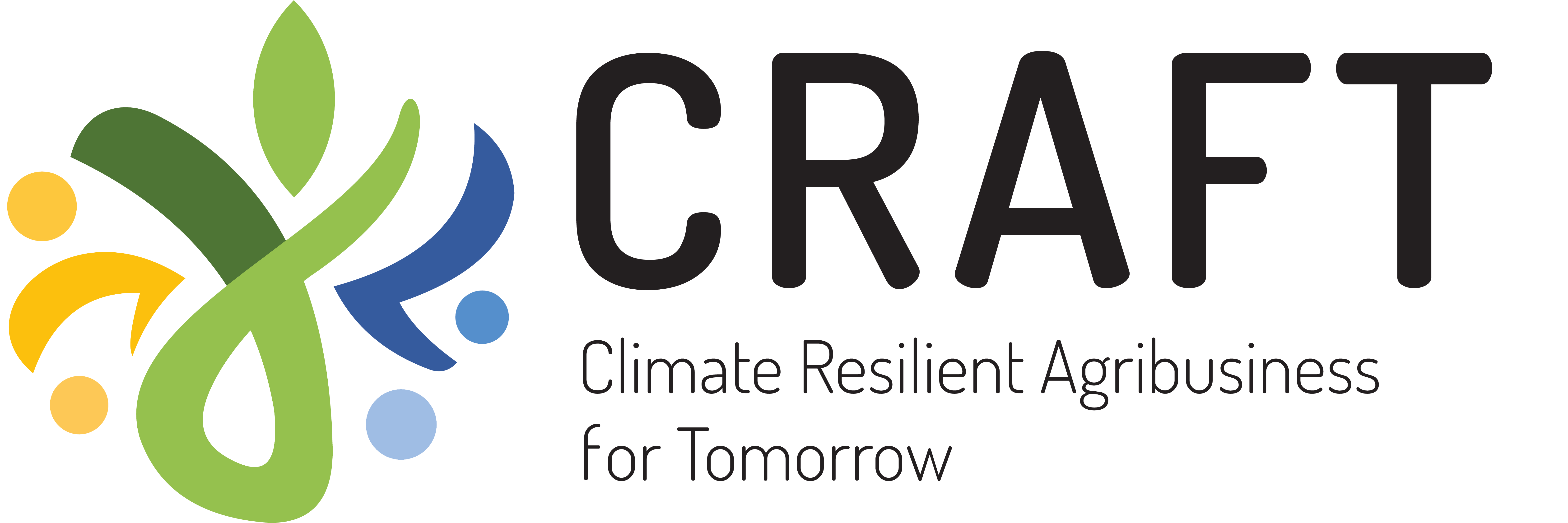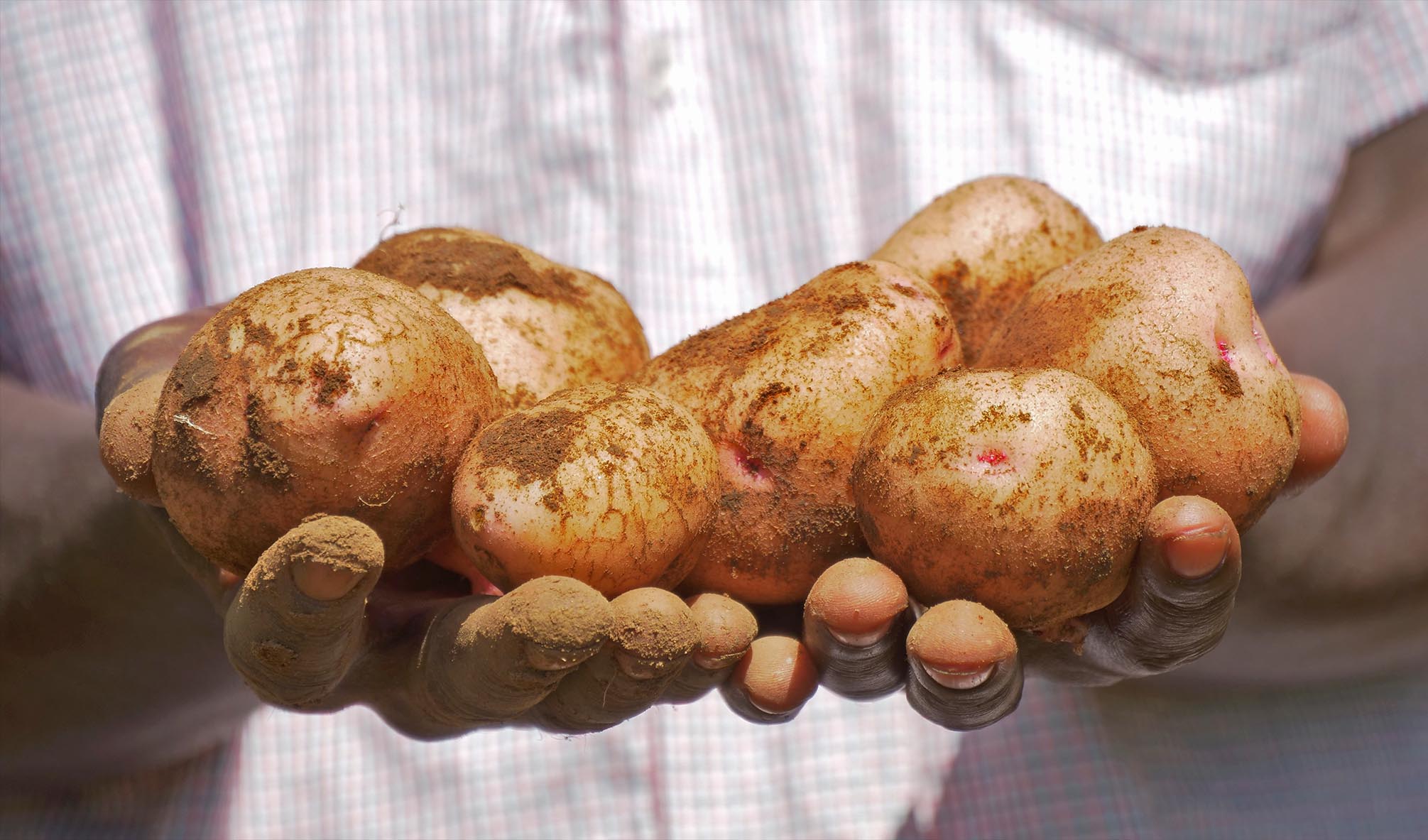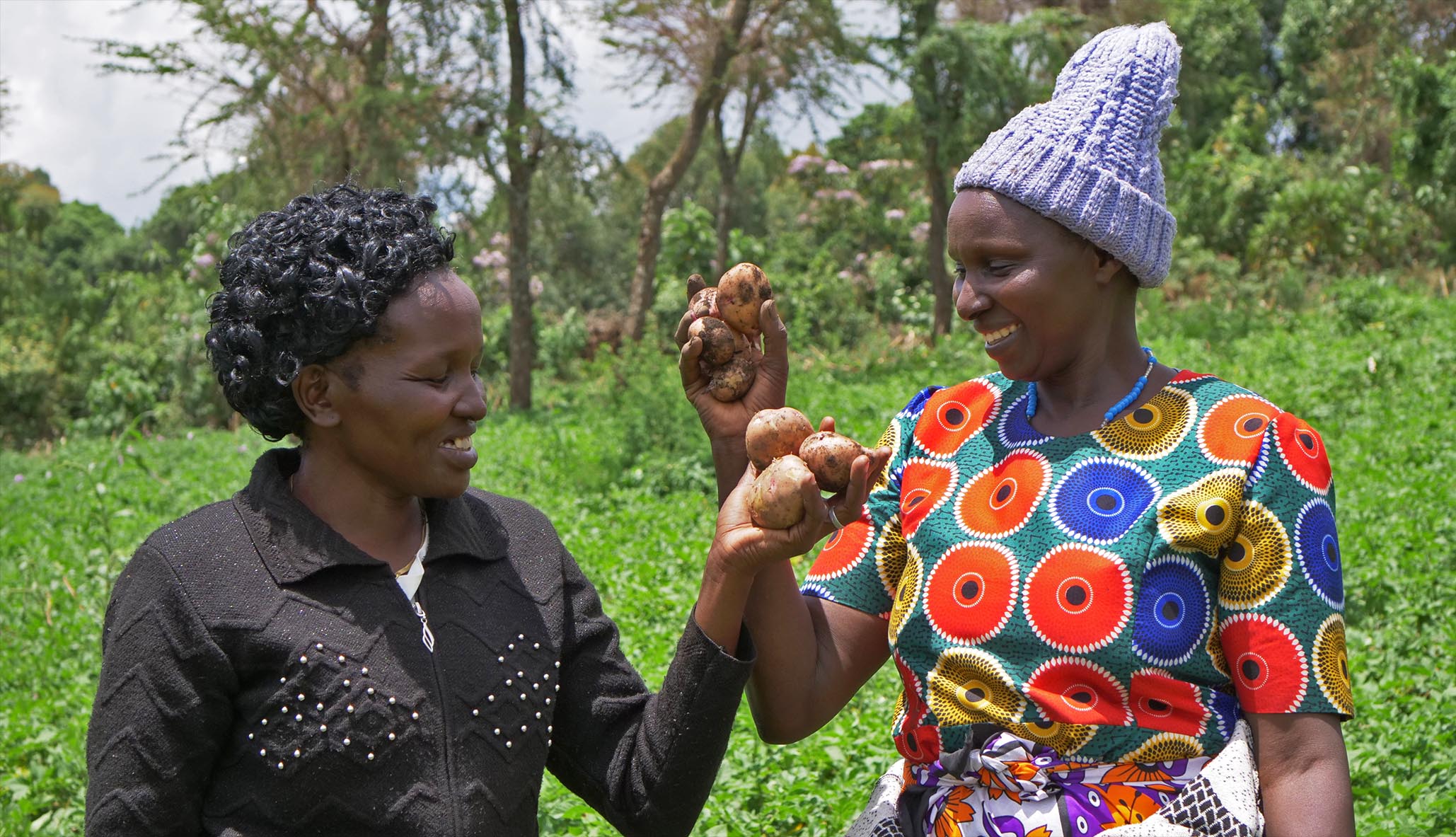Introduction to Sereni Fries Limited
Humphry Mburu, originally a banker, fulfilled his entrepreneurial dream in 2012 by founding Sereni Fries to cater to Kenya's growing hospitality industry with fresh potato products. The company, officially registered in March 2015, started with two staff members, and has since grown to 47 permanent and 13 casual employees, with branches in Nairobi, Mombasa, and Nakuru. Sereni sources potatoes directly from local farmers, processing them into fresh potato products such as chips. The company supplies fresh potato products to the hospitality industry and chips to retailers in Nairobi, Mombasa, and Nakuru. With plans to become a supplier for a major fast-food chain in Kenya, Sereni Fries aims to further expand, benefiting the local potato farmers it collaborates with.
“To meet specific standards for chips production, Sereni engages in contract farming with local farmers, supporting them from planting to harvesting. We have Agronomists work directly with farmers in various potato-growing regions, providing training on climate smart agriculture and proper farm input use for maximum yields and quality. Currently collaborating with 3,500 farmers in regions like Nyandarua, Nakuru, Bomet, Narok, Meru, Elgeyo Marakwet, and Uasin Gishu. This approach ensures adherence to commercial processing standards and addresses challenges faced by potato farmers, including market access by purchasing directly from farmers, Sereni eliminates brokers, offering fair prices and ensuring a consistent supply. The company's cold potato storage facility allows us to store potatoes for extended periods, avoiding price fluctuations during low seasons, creating a mutually beneficial situation for both farmers and the processor “said Humprey Mburu, MD for Sereni.
Partnership with CRAFT
Sereni began its two-year partnership journey with the CRAFT project in August 2020 during the initial phase of its potato chips line. One of the most significant milestones in the project was the increase in chip production achieved by procuring and installing an automated production line. While this milestone was achieved, Sereni had a shortage of raw materials as the desired processing potato varieties (Markies, Dutch Robjin, Destiny etc.) had been adversely affected by unfavorable climatic conditions in 2021 such as drought and frost, forcing them to shut down potato chips production completely. Nonetheless, Sereni continued processing freshly cut potatoes for the HoReCa Market.
Amid the potato chips line closure, they recognized an opportunity in frozen fries, a relatively new product in the Kenyan market. It was a viable product as it offered a higher price per kilogram (up to 3 times more) from the market and a longer 6-month storage period compared to fresh cuts. International fast-food chains, such as KFC, were importing these products, but the covid pandemic disrupted imports due to controlled trade. Simultaneously, consumer demand for takeout food, including French fries, surged due to lockdown. To seize this opportunity, they invested around €240,000.in a frozen line machine, capable of processing 5 tonnes/hour, and successfully launched their first product in September 2021.
During the 2023 long rain season (March to May), Sereni procured 199,402 Kgs from farmers, but it fell short of their demand. They were only able to buy back from 34% of the 2404 farmers they had reached through the partnership hence they sought to continue their partnership with CRAFT to enable them to reach more farmers who were interested in contract farming leading to an extension period of the partnership to end of March 2023. During this 6-month period, they were able to train 300 additional farmers but 10 were put on a supply contract with an average of 21.3 acres.
The cost of buyback increased from their budget of € 0.15 per kg to € 0.34 per kg., leading to increased cost of sales. To further reduce post-harvest losses at aggregation stage, Sereni had procured 6,000 netted bags that were distributed to the farmers during harvest in that season. However, they have still managed to increase their revenue.
The turnover before partnership with CRAFT was € 634,323 and grew to €1,049,000 in 2022.
In December 2021, discussions began between KFC and Sereni regarding a supply contract for frozen fries, as KFC's local supply had run out. However, challenges arose due to the necessity for continuous supply, exacerbated by increased production costs and unpredictable weather conditions leading to reduced yields in 2022. This situation temporarily halted the collaboration. Despite these challenges, Sereni adapted by shifting its focus to the retail market, making its products available in supermarkets. Simultaneously, Sereni is exploring collaborations with importers of frozen fries to ensure quality standards are met.
Sereni's commitment to meeting international food safety standards and developing a traceability guide proved to be a competitive advantage. This dedication enabled them to successfully enter major retail markets such as Naivas and Quick Mart. The consumer response was positive, with retail stores quickly selling out of Sereni's products. To maintain quality, 300 farmers and 10 field staff underwent training on standard operating procedures, contributing to the overall success of Sereni's venture.
They currently process 52 tonnes per month, but securing enough raw materials from farmers remains a challenge to process optimal capacity due to limited production of desired processing varieties with the most common variety produced in Kenya being Shangi.
They expect to increase their turnover to € 1,724,130 by the end of 2023 and doubling it to € 3,586,200 by the end of 2024. They also aim to expand their buyback to over 300 tonnes per month and establish aggregation centres equipped with wooden crates to address packaging challenges.
As they look to increase their processing capacity to 40 tonnes per day, they also would like to tap into the export market, but this will require continuous support and engagement with farmers to increase their access to raw materials. Through CRAFT, Sereni has improved their quality and quantity of raw materials and improved their business efficiency.
Anthony Wamae’s Hopes in Potato farming revived by Sereni.
The Muruaki Group is situated in the Kinangop Area of Nyandarua County, Kenya, an area where the CRAFT project has had a positive impact. The Group, like many other regional farmer communities, faced numerous obstacles such as a shortage of quality seeds, restricted market access, limited financial management information, and insufficient guidance on potato production. Due to their limited understanding of potato cultivation, the farmers experienced low yields and financial setbacks, prompting some, including Anthony Wamae, to shift to alternative farming ventures and economic activities and abandon potato farming.
“Our area is well known for growing potatoes, but the ever-changing weather and the unscrupulous middlemen have ensured that we are going to continue suffering. I have since decided to concentrate on dairy farming.” Anthony lamented.
From September 2020 to March 2021, Mr. Wamae received training in climate-smart agriculture, conducted by the Sereni extension team. The practical sessions held at demonstration sites were particularly valuable for him in grasping the concepts. Applying his training, he successfully obtained a supply contract with Sereni Fries in December 2021 for a crop on less than 1 acre, with an expected yield of 7 tons per acre. Impressively, during the May 2022 harvest, he surpassed expectations by achieving a crop yield of 12.25 tonnes per acre.
“In this area, the best you can get is 7 tons per acre and that is when the weather is favourable. Getting 12 tons is a miracle and the neighbours are asking if this is some kind of magic!” explains Anthony.
He went ahead to explain that having a contract with Sereni ensured that he got the best prices and despite the high cost of production he was able to make huge profits. With a price of 0.19 euros per kg, he was able to rake in 2269 euros. With the cost of production approximated at 1127 euros, Mr. Wamae made a profit of 1141 euros.
“If you asked me one year ago, I would tell you this was impossible but now that I have experienced it, I know it is possible. I can now take my children to school comfortably without worrying about school fees!”, said an excited Anthony.
Mr. Wamae expressed that applying the knowledge gained from the training was enlightening. He emphasized the transformative impact of having a contract, highlighting its role in providing a reliable market for his produce, in contrast to the uncertainty associated with dependent brokers. He underscored the significant improvement in production achieved using certified seeds, as opposed to recycled ones. Furthermore, he mentioned his newfound ability to implement effective soil fertility and water management practices, along with proper handling of agrochemicals for crop protection.
Humphry Mburu, originally a banker, fulfilled his entrepreneurial dream in 2012 by founding Sereni Fries to cater to Kenya's growing hospitality industry with fresh potato products. The company, officially registered in March 2015, started with two staff members, and has since grown to 47 permanent and 13 casual employees, with branches in Nairobi, Mombasa, and Nakuru. Sereni sources potatoes directly from local farmers, processing them into fresh potato products such as chips. The company supplies fresh potato products to the hospitality industry and chips to retailers in Nairobi, Mombasa, and Nakuru. With plans to become a supplier for a major fast-food chain in Kenya, Sereni Fries aims to further expand, benefiting the local potato farmers it collaborates with.
“To meet specific standards for chips production, Sereni engages in contract farming with local farmers, supporting them from planting to harvesting. We have Agronomists work directly with farmers in various potato-growing regions, providing training on climate smart agriculture and proper farm input use for maximum yields and quality. Currently collaborating with 3,500 farmers in regions like Nyandarua, Nakuru, Bomet, Narok, Meru, Elgeyo Marakwet, and Uasin Gishu. This approach ensures adherence to commercial processing standards and addresses challenges faced by potato farmers, including market access By purchasing directly from farmers, Sereni eliminates brokers, offering fair prices and ensuring a consistent supply. The company's cold potato storage facility allows us to store potatoes for extended periods, avoiding price fluctuations during low seasons, creating a mutually beneficial situation for both farmers and the processor “said Humprey Mburu, MD for Sereni.
Partnership with CRAFT
Sereni began its two-year partnership journey with the CRAFT project in August 2020 during the initial phase of its potato chips line. One of the most significant milestones in the project was the increase in chip production achieved by procuring and installing an automated production line. While this milestone was achieved, Sereni had a shortage of raw materials as the desired processing potato varieties (Markies, Dutch Robjin, Destiny etc.) had been adversely affected by unfavourable climatic conditions in 2021 such as drought and frost, forcing them to shut down potato chips production completely. Nonetheless, Sereni continued processing freshly cut potatoes for the HoReCa Market.
Amid the potato chips line closure, they recognized an opportunity in frozen fries, a relatively new product in the Kenyan market. It was a viable product as it offered a higher price per kilogram (up to 3 times more) from the market and a longer 6-month storage period compared to fresh cuts. International fast-food chains, such as KFC, were importing these products, but the covid pandemic disrupted imports due to controlled trade. Simultaneously, consumer demand for takeout food, including French fries, surged due to lockdown. To seize this opportunity, they invested around €240,000.in a frozen line machine, capable of processing 5 tonnes/hour, and successfully launched their first product in September 2021.
During the 2023 long rain season (March to May), Sereni procured 199,402 Kgs from farmers, but it fell short of their demand. They were only able to buyback from 34% of the 2404 farmers they had reached through the partnership hence they sought to continue their partnership with CRAFT to enable them to reach more farmers who were interested in contract farming leading to an extension period of the partnership to end of March 2023. During this 6-month period, they were able to train 300 additional farmers but 10 were put on a supply contract with an average of 21.3 acres.
The cost of buyback increased from their budget of € 0.15 per kg to € 0.34 per kg., leading to increased cost of sales. To further reduce post-harvest losses at aggregation stage, Sereni had procured 6,000 netted bags that were distributed to the farmers during harvest in that season. However, they have still managed to increase their revenue. The turnover before partnership with CRAFT was € 634,323 and grew to €1,049,000 in 2022.
In December 2021, discussions began between KFC and Sereni regarding a supply contract for frozen fries, as KFC's local supply had run out. However, challenges arose due to the necessity for continuous supply, exacerbated by increased production costs and unpredictable weather conditions leading to reduced yields in 2022. This situation temporarily halted the collaboration. Despite these challenges, Sereni adapted by shifting its focus to the retail market, making its products available in supermarkets. Simultaneously, Sereni is exploring collaborations with importers of frozen fries to ensure quality standards are met.
Sereni's commitment to meeting international food safety standards and developing a traceability guide proved to be a competitive advantage. This dedication enabled them to successfully enter major retail markets such as Naivas and Quick Mart. The consumer response was positive, with retail stores quickly selling out of Sereni's products. To maintain quality, 300 farmers and 10 field staff underwent training on standard operating procedures, contributing to the overall success of Sereni's venture.
They currently process 52 tonnes per month, but securing enough raw materials from farmers remains a challenge to process optimal capacity due to limited production of desired processing varieties with the most common variety produced in Kenya being Shangi.
They expect to increase their turnover to € 1,724,130 by the end of 2023 and doubling it to € 3,586,200 by the end of 2024. They also aim to expand their buyback to over 300 tonnes per month and establish aggregation centres equipped with wooden crates to address packaging challenges.
As they look to increase their processing capacity to 40 tonnes per day, they also would like to tap into the export market, but this will require continuous support and engagement with farmers to increase their access to raw materials. Through CRAFT, Sereni has improved their quality and quantity of raw materials and improved their business efficiency.
Anthony Wamae’s Hopes in Potato farming revived by Sereni.
The Muruaki Group is situated in the Kinangop Area of Nyandarua County, Kenya, an area where the CRAFT project has had a positive impact. The Group, like many other regional farmer communities, faced numerous obstacles such as a shortage of quality seeds, restricted market access, limited financial management information, and insufficient guidance on potato production. Due to their limited understanding of potato cultivation, the farmers experienced low yields and financial setbacks, prompting some, including Anthony Wamae, to shift to alternative farming ventures and economic activities and abandon potato farming.
“Our area is well known for growing potatoes, but the ever-changing weather and the unscrupulous middlemen have ensured that we are going to continue suffering. I have since decided to concentrate on dairy farming.” Anthony lamented.
From September 2020 to March 2021, Mr. Wamae received training in climate-smart agriculture, conducted by the Sereni extension team. The practical sessions held at demonstration sites were particularly valuable for him in grasping the concepts. Applying his training, he successfully obtained a supply contract with Sereni Fries in December 2021 for a crop on less than 1 acre, with an expected yield of 7 tons per acre. Impressively, during the May 2022 harvest, he surpassed expectations by achieving a crop yield of 12.25 tonnes per acre.
“In this area, the best you can get is 7 tons per acre and that is when the weather is favourable. Getting 12 tons is a miracle and the neighbours are asking if this is some kind of magic!” explains Anthony.
He went ahead to explain that having a contract with Sereni ensured that he got the best prices and despite the high cost of production he was able to make huge profits. With a price of 0.19 euros per kg, he was able to rake in 2269 euros. With the cost of production approximated at 1127 euros, Mr. Wamae made a profit of 1141 euros.
“If you asked me one year ago, I would tell you this was impossible but now that I have experienced it, I know it is possible. I can now take my children to school comfortably without worrying about school fees!”, said an excited Anthony.
Mr. Wamae expressed that applying the knowledge gained from the training was enlightening. He emphasized the transformative impact of having a contract, highlighting its role in providing a reliable market for his produce, in contrast to the uncertainty associated with dependent brokers. He underscored the significant improvement in production achieved using certified seeds, as opposed to recycled ones. Furthermore, he mentioned his newfound ability to implement effective soil fertility and water management practices, along with proper handling of agrochemicals for crop protection.
By Ivy Wainaina










